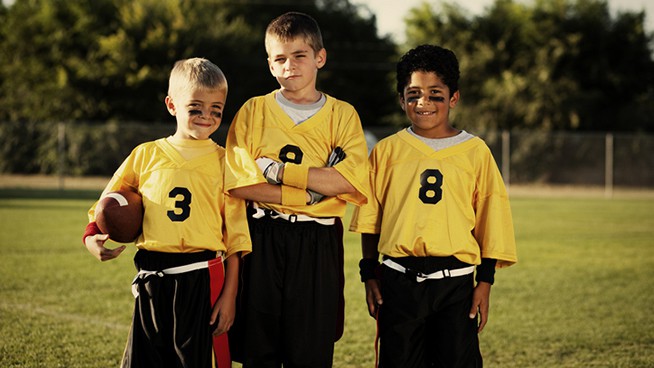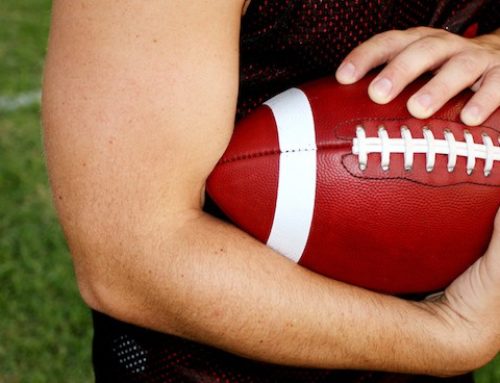The Perfect Storm: How Quinnen Williams Became a Generational Talent

How does a player go from college back-up to potential No. 1 overall pick in under a year? It takes a perfect storm.
For Quinnen Williams, that’s what 2018 was. After spending his first two seasons at the University of Alabama as a relatively anonymous reserve, Williams unleashed his wrath on college football last fall. The defensive tackle captured the Outland Trophy and earned unanimous first-team All-American honors after recording 70 tackles, 18.5 tackles for loss and seven sacks. Offensive linemen have said facing Williams is like trying to block a “300-pound bar of soap.” While he became a top NFL prospect in a flash, the storm had been brewing for years, gathering steam on the humid high school fields of Birmingham, then building strength outside the spotlight in Tuscaloosa.
The son of Marquischa Henderson Williams and Quincy Williams Sr., Quinnen was born into a family of educators. His mother, grandmother and uncle were all teachers, and C’s were unacceptable in the Williams household. When a big-for-his-age Quinnen began bouncing off the walls, his parents steered him toward athletics. More than anything, sports were a way to keep their children off the streets of west Birmingham.
“My mom, she really just wanted me to do everything. She wanted me and my brothers and sister to venture off. I played tennis, soccer. My big brother swam a lot, so I swam. I played football and basketball. I played pretty much all the sports growing up,” Williams says. “(Sports) was doing something just to stay focused and stay (away) from the distractions that were going on in the city.”
Williams was a marvelous athlete, but football was mostly just fun and games during his childhood. A self-described mama’s boy, he didn’t have the natural intensity of his older brother, Quincy Jr. Then, in the summer of 2010, Quinnen found his world turned upside down. His mother had survived a bout with breast cancer five years earlier, but doctors discovered it had returned. Within five weeks of her admission into a Birmingham hospital, she was gone. Marquischa Henderson Williams passed away at 38 years old. The family was left with a massive void, and each processed it in their own way. A heartbroken Quinnen soon threw himself headlong into the game of football.

His transformation into a star at Wenonah High School took time. As the only freshman starter on the varsity team, he remembers being physically manhandled by certain opponents. “I was getting thrown around a lot. I held my ground most times, but I wasn’t big enough, I wasn’t strong enough, I wasn’t fast enough. I was smart, so I could use my smarts to get around certain stuff and make plays, but when it came down to being strong and holding down the pocket and pushing the pocket, it wasn’t me at the time,” Williams says. “I wasn’t physical at all. I was a playful football player. That physicality had to come with getting tossed around.”
The raw ingredients of a disruptive force were present. A childhood spent playing multiple sports gifted Williams with extraordinary agility for his size. “I played tennis, soccer and swam. Those three sports, those are something somebody my size never does,” Williams says. “I was already in shape because of swimming. Footwork good because of soccer. Mobility good because I played tennis.” When he learned he could receive an athletic scholarship to pay for college, a concept that was entirely foreign to him before his freshman year of high school, his goal wrote itself. Luckily, he was not one to be easily discouraged.
“The first time I lifted weights (with the high school team), it was like a joke. Everybody was standing around me like, ‘Bro, he can’t even bench 25 on this side, 25 on this side—I know girls that bench that!’” Williams says, recalling how he couldn’t move 95 pounds on the Bench Press at one point. “I can laugh about it now.” The school’s modest weight room soon wasn’t enough to contain his ambition. Inspired by anecdotes of legendary workers like Kobe Bryant, Williams began waking up before school to run around his neighborhood. His older brother joined him, and the morning workouts became a sort of competitive bonding.
“(Quincy Jr.) used to have tremendous cardio. I’m like ‘man, how you never get tired?’ He could run with me, never get tired,” Williams says. “He was just teaching me (how to train)—like, ‘bro, you can do this, you can do that. you can do this.’ It became a competition. Who can wake up first? Who gets their gear on first? Let’s go run. Who can finish? Who ain’t gonna bend ever? So different stuff like that really shaped me.”
As Quinnen physically matured, he became a nightmare for opponents. While he starred on Wenonah’s defensive line, he also punted and spent time at offensive guard. His first offer came from Auburn, a school he’d grown up idolizing (his mother and grandmother were big fans). Crimson Tide coaches later became enamored with Williams at a recruiting camp in Tuscaloosa. He wasn’t just a freak athlete, but he sprinted from drill to drill and seemed invincible to fatigue. Playing at 6-foot-3, 260 pounds his senior year of high school, Williams racked up 90 tackles, 15.5 tackles for loss and eight sacks. When he visited Alabama and saw a small army of current NFL players hanging out and training at the facility, he knew the program must be doing something right. “I’m like why do these NFL guys come back here to get treatment and train?” Williams says. “It’s because it’s the best.”
When Williams committed to the Crimson Tide on National Signing Day in 2106, he was not a highly-touted recruit—at least not by Alabama’s standards. 247Sports pegged him as 155th-best recruit nationally, and the 17th-best at his position. But Nick Saban believed his staff got a kid with tremendous potential.
“He was probably 260 pounds in high school. He (was) not a real big guy to start with but we felt like with the new age of football, he would be the right kind of guy that would be more athletic, who could pass rush. We thought he would be a defensive end,” Saban said last fall during his weekly radio show.
Williams marvels at how far he’s come over the last three years. “When I first got (to Alabama), I couldn’t bench 225 five times. I was small, I had a lot of body fat. I wasn’t strong,” Williams says. “They’d just seen something in me, they seen the work ethic in me, and they just put that machine they had behind me. They turned me into a whole new beast, a whole new human.”
His evolution started on the scout team. Williams redshirted his freshman year, and it was his job to get Cam Robinson, the team’s monstrous starting left tackle, prepped for games. There was no tougher opponent in college football, as Robinson was a consensus All-American who won the Outland Trophy and the Jacobs Blocking Trophy that season. “He kept it 100 with me all the time. He was like, ‘I’m gonna whoop your butt.’ It molded me into the man I am today. Being on the scout team and going against Cam every day and knowing he was the best at his position at the time, (I knew) if I can beat him, I can beat everybody,” Williams says. “He always taught me stuff. Like, ‘Q, don’t put your hand here, because it’s easy to do this.’” Williams became pegged as a potential future star inside the program, winning the Scout Team Player of the Week award on no fewer than 10 occasions.
The “learning year,” as Williams calls it, was invaluable in his growth. Stronger, faster and smarter, he played his way into the rotation as a redshirt freshman, tallying 20 tackles and 6.5 tackles for loss. The Crimson Tide won the national championship that season. In the victorious afterglow, Williams half-jokingly suggested to Daron Payne, who was departing for the NFL, that he was going to switch to nose guard. He may have been kidding at the time, but there was a grain of truth to it —Isaiah Buggs and Raekwon Davis were penciled in as returning starters at defensive end in the Crimson Tide’s 3-4 defense, and Williams yearned to start.
A few weeks later, Williams visited Saban’s palatial office. “I was like, ’Coach Saban, man, I want to play. Whatever I got to do, let me know. I want to play,’” Williams recalls. “He said, ‘Quinnen Williams, you’re going to have to work to play nose guard. If you work your butt off, you can have whatever you want. But it’s not going to be given to you.’” Williams saw the proposed position change as a direct challenge, and though he had three seasons of eligibility remaining, he felt a searing urgency to earn a starting job.

As soon as he left Saban’s office, he met with team nutritionist Amy Bragg. Williams weighed 275 at the time and had just a few months to get to the 300 pounds needed to play nose guard in the SEC. The two put together an eating plan that included mammoth amounts of chicken, steak, turkey, salad, pasta and other quality options for cultivating mass. “We talked about a plan to gain weight, but not a lot of body fat,” Williams says.
After meeting with Bragg, Williams sat down with head strength and conditioning coach Scott Cochran. The two plotted a training strategy to bulk him up without sacrificing his lethal speed and agility. “I still wanted to have my end speed. I wanted to be a big defensive end playing nose guard, basically,” Williams says.
With expertly crafted plans in hand, Williams clocked in. He followed every detail to a T, bringing a Saban-esque focus to his newfound routine. “That’s when I learned how to really be disciplined. Because I wanted something,” Williams says. “(The plan) turned into my life.”
He began falling asleep by 11 p.m. and waking up at 7 a.m. each day, as body composition can be negatively impacted by an irregular sleep schedule. He resisted the sharp cravings for pizza and wings. He devoured hundreds of hours of film of other nose guards, searching for techniques to help him thrive despite his lack of girth.
“When I moved to nose guard, I was small. I was like I gotta find some way (to compensate for my lack of size). Then, Boom! It hit me. I learn the technique and I’m straight,” Williams says. “I became like a doctor at technique. I was watching film, I was doing it to the max now. I was watching film on Daron Payne, Dalvin (Tomlinson), A’Shawn (Robinson), Jarran Reed, Warren Sapp.” He closely studied the get-offs of both Payne and Philadelphia Eagles’ All-Pro Fletcher Cox, testing what he learned in practice. “Fletcher Cox is like 325, but his get-off is amazing,” Williams says. “I learned to get off like that.”
Tomlinson was a three-time state heavyweight wrestling champion in high school, and Williams scrutinized his game for tricks to maximize leverage and play above his weight. “He wasn’t the fastest guy, he wasn’t the strongest guy, but his technique was amazing. He was a technician,” Williams says. “He wasted no energy because of the technique of it. It was amazing for me to see that.” Alabama’s all-star coaching staff helped Williams jigsaw together different skills, and he soaked up their wisdom like a sponge.
Last fall, a new beast emerged. Williams had gained roughly 30 pounds during the offseason, and his bench press max had rocketed from 315 pounds to an astonishing 500. When the season started, opponents discovered grappling with Alabama’s new nose guard was like trying to block a greased-up wrecking ball.

A Week 1 victory over Louisville was his coming out party, as he tallied 6 tackles, 3.5 tackles for loss and a pass defended. As the season went on, NFL analysts drooled over Williams’ play. A guy who’d been a rotational player a season prior was now the most dominant defensive lineman in college football. The newfound fame didn’t change his work ethic—one of the many lessons he’s learned from Saban is not to change something if it’s working. Williams had always been a guy who let his play talk for him (he has the phrase “Actions Speak Louder Than Words” tattooed on his massive left calf), but teammates expected him to be more of a vocal leader as his star rose. It took some time for him to become comfortable in that role, but he soon began sharing the inner monologue that fueled his motivation.
“I wanted to make sure everyone knew where my head was at. My head is not big because of all the accolades I’m getting. I wanted to make sure everyone knew I was going to keep working hard,” Williams says. “If you not doing the work, you can’t say nothing.”
Williams’ family kept him humble, too. When Quinnen told his grandma he was thinking about declaring early after last year’s SEC Championship Game, her initial emotion was disappointment—how could her grandson be dropping out of college before he got his degree? Quinnen explained Alabama has a program to help early departees finish their schooling, an opportunity he plans to take advantage of.
His overnight celebrity did give Williams a new appreciation for certain Saban-isms. Saban’s fond of calling positive press “rat poison,” which Williams never really understood prior to last season. “I was like Coach Saban’s crazy. I love the media. It gets you more followers, everybody knows who you is, they get you out there. But as I became an All-American, I was like, ‘This is why Coach Saban don’t like the media.’ Because they over-project you,” Williams says. “Then—like the Clemson game, when we lost—they trash who you are. ‘Quinnen Williams ain’t do this, Quinnen Williams ain’t sack Trevor Lawrence.’ But a few weeks before, it was like, ‘Oh my gosh, Quinnen Williams beat Kyler Murray.’ Stuff like that. As I went through that, I was like, this is why Coach Saban doesn’t like the media.”
After Williams’ dominant year, he consulted with Saban about coming out early. Saban told him the truth—NFL decision-makers saw him as a potential top-five overall pick. With little room to improve his stock, Williams declared for the 2019 NFL Draft. STACK caught up with him at Mamba Sports Academy in Thousand Oaks, California, where he trained ahead of the NFL Combine. For as punishing as Williams is on the field, he’s soft-spoken and polite outside of shoulder pads, with an easy smile that reveals a set of braces. He’s got the face of a 16-year-old and the skillset of a potential Hall of Famer.
He’s also not much of a partier. To unwind, he likes to look up different cars on YouTube. “I’m a really big car guy. I like listening to car engines—different exhaust types, car engines. V8, V10, V12,” Williams says. Between sessions at Mamba, he’d hit local dealerships and giddily test drive Bentleys or Lamborghinis. When New York Jets All-Pro and former Alabama linebacker C.J. Mosley called him to congratulate him on his accomplishments, Williams was awestruck. “It’s just crazy how I went from playing Madden with C.J. Mosley to (him) calling me and congratulating me on my accomplishments. I’m like you’re the star player on my ultimate team—to hear you say that to me is crazy!” Williams says.
When quizzed on his objectives for the Combine, he revealed he’d set a list of goals that can be generously dubbed fantastical. In his mind, the more ambitious the goal he sets, the harder he’ll work. “If I can work to get a 4.4 but I hit a 4.7, that’s still amazing,” Williams says. “I’m training with receivers and DBs (here). I gotta keep up with them. Ain’t no falling back because I’m 100 pounds.” The results were jaw-dropping. At the Combine, Williams clocked a 4.87 on his first attempt in the 40-Yard Dash, an outstanding result for a 303-pound behemoth. His agent, Nicole Lynn, told him to not to run again—no need to risk a pulled hammy when you’ve already clocked a killer time. Williams didn’t listen and ran a 4.83 on his second attempt. Paired with a 9-foot-4 Broad Jump and an impressive performance in the positional drills, the workout sent Williams’ already lofty draft stock climbing even higher.
When it surfaced Williams had put down four Double Stuf Oreos shortly before he clocked his blazing 40, many football fans assumed he was successful in spite of a junk food diet. In reality, the opposite is true. Sweets are largely reserved for immediately prior to intense competition, offering a quick hit of carbs and comfort. Prior to games at Alabama, Williams would down two Oatmeal Creme Pies he swiped from Saban’s personal stash. “I just like that feeling. I had to eat healthy, so it was that feeling of like sugar. It kinda calmed me down,” Williams says. But aside from that, he keeps a clean diet. “This may sound weird, but I look at Aaron Donald’s body. I’m like man, I want that body…the abs, the low body fat, but still built, muscular so you can hold down the pocket,” Williams says. “I’m like I’ll eat this nasty food if I can get that body.”

When you peel back the layers of Williams’ motivation, family is his fuel. When he doesn’t want to pull himself out of bed, he thinks back to what his mother would tell him. He feels it is now his responsibility to take care of the Williams clan. “Whenever I feel that pain in my body, I just feel like the pain (they’ll have) if I quit. If I don’t get up and work out this morning, how they gonna feel?” Williams says. “Wanting not to let them down. Wanting to take care of them and make sure they’re OK. I have the opportunity.”
Williams will be expected to be a defensive anchor for an NFL team from Day 1. Scouting reports are so glowing that anything less than a Pro Bowl career will be dubbed a disappointment. “(Williams) dominates with a rare blend of quickness, power, flexibility, processing skills and technique that make him primed for a sensational career as a standout playmaker,” writes Joe Marino of The Draft Network. “(He) has the upside to become one of the NFL’s best defensive linemen and a cornerstone of a franchise.” Williams shrugs off the high praise, believing his ceiling is still miles away. Getting drafted is just the start of something bigger.
“The work ethic I have, I’m always going to be confident in what I do,” Williams says. “I know how much work and I know the discipline part of what I need to do to be the best.”
Photo Credit: Jamie Schwaberow/Getty Images
RECOMMENDED FOR YOU
MOST POPULAR
The Perfect Storm: How Quinnen Williams Became a Generational Talent

How does a player go from college back-up to potential No. 1 overall pick in under a year? It takes a perfect storm.
For Quinnen Williams, that’s what 2018 was. After spending his first two seasons at the University of Alabama as a relatively anonymous reserve, Williams unleashed his wrath on college football last fall. The defensive tackle captured the Outland Trophy and earned unanimous first-team All-American honors after recording 70 tackles, 18.5 tackles for loss and seven sacks. Offensive linemen have said facing Williams is like trying to block a “300-pound bar of soap.” While he became a top NFL prospect in a flash, the storm had been brewing for years, gathering steam on the humid high school fields of Birmingham, then building strength outside the spotlight in Tuscaloosa.
The son of Marquischa Henderson Williams and Quincy Williams Sr., Quinnen was born into a family of educators. His mother, grandmother and uncle were all teachers, and C’s were unacceptable in the Williams household. When a big-for-his-age Quinnen began bouncing off the walls, his parents steered him toward athletics. More than anything, sports were a way to keep their children off the streets of west Birmingham.
“My mom, she really just wanted me to do everything. She wanted me and my brothers and sister to venture off. I played tennis, soccer. My big brother swam a lot, so I swam. I played football and basketball. I played pretty much all the sports growing up,” Williams says. “(Sports) was doing something just to stay focused and stay (away) from the distractions that were going on in the city.”
Williams was a marvelous athlete, but football was mostly just fun and games during his childhood. A self-described mama’s boy, he didn’t have the natural intensity of his older brother, Quincy Jr. Then, in the summer of 2010, Quinnen found his world turned upside down. His mother had survived a bout with breast cancer five years earlier, but doctors discovered it had returned. Within five weeks of her admission into a Birmingham hospital, she was gone. Marquischa Henderson Williams passed away at 38 years old. The family was left with a massive void, and each processed it in their own way. A heartbroken Quinnen soon threw himself headlong into the game of football.

His transformation into a star at Wenonah High School took time. As the only freshman starter on the varsity team, he remembers being physically manhandled by certain opponents. “I was getting thrown around a lot. I held my ground most times, but I wasn’t big enough, I wasn’t strong enough, I wasn’t fast enough. I was smart, so I could use my smarts to get around certain stuff and make plays, but when it came down to being strong and holding down the pocket and pushing the pocket, it wasn’t me at the time,” Williams says. “I wasn’t physical at all. I was a playful football player. That physicality had to come with getting tossed around.”
The raw ingredients of a disruptive force were present. A childhood spent playing multiple sports gifted Williams with extraordinary agility for his size. “I played tennis, soccer and swam. Those three sports, those are something somebody my size never does,” Williams says. “I was already in shape because of swimming. Footwork good because of soccer. Mobility good because I played tennis.” When he learned he could receive an athletic scholarship to pay for college, a concept that was entirely foreign to him before his freshman year of high school, his goal wrote itself. Luckily, he was not one to be easily discouraged.
“The first time I lifted weights (with the high school team), it was like a joke. Everybody was standing around me like, ‘Bro, he can’t even bench 25 on this side, 25 on this side—I know girls that bench that!’” Williams says, recalling how he couldn’t move 95 pounds on the Bench Press at one point. “I can laugh about it now.” The school’s modest weight room soon wasn’t enough to contain his ambition. Inspired by anecdotes of legendary workers like Kobe Bryant, Williams began waking up before school to run around his neighborhood. His older brother joined him, and the morning workouts became a sort of competitive bonding.
“(Quincy Jr.) used to have tremendous cardio. I’m like ‘man, how you never get tired?’ He could run with me, never get tired,” Williams says. “He was just teaching me (how to train)—like, ‘bro, you can do this, you can do that. you can do this.’ It became a competition. Who can wake up first? Who gets their gear on first? Let’s go run. Who can finish? Who ain’t gonna bend ever? So different stuff like that really shaped me.”
As Quinnen physically matured, he became a nightmare for opponents. While he starred on Wenonah’s defensive line, he also punted and spent time at offensive guard. His first offer came from Auburn, a school he’d grown up idolizing (his mother and grandmother were big fans). Crimson Tide coaches later became enamored with Williams at a recruiting camp in Tuscaloosa. He wasn’t just a freak athlete, but he sprinted from drill to drill and seemed invincible to fatigue. Playing at 6-foot-3, 260 pounds his senior year of high school, Williams racked up 90 tackles, 15.5 tackles for loss and eight sacks. When he visited Alabama and saw a small army of current NFL players hanging out and training at the facility, he knew the program must be doing something right. “I’m like why do these NFL guys come back here to get treatment and train?” Williams says. “It’s because it’s the best.”
When Williams committed to the Crimson Tide on National Signing Day in 2106, he was not a highly-touted recruit—at least not by Alabama’s standards. 247Sports pegged him as 155th-best recruit nationally, and the 17th-best at his position. But Nick Saban believed his staff got a kid with tremendous potential.
“He was probably 260 pounds in high school. He (was) not a real big guy to start with but we felt like with the new age of football, he would be the right kind of guy that would be more athletic, who could pass rush. We thought he would be a defensive end,” Saban said last fall during his weekly radio show.
Williams marvels at how far he’s come over the last three years. “When I first got (to Alabama), I couldn’t bench 225 five times. I was small, I had a lot of body fat. I wasn’t strong,” Williams says. “They’d just seen something in me, they seen the work ethic in me, and they just put that machine they had behind me. They turned me into a whole new beast, a whole new human.”
His evolution started on the scout team. Williams redshirted his freshman year, and it was his job to get Cam Robinson, the team’s monstrous starting left tackle, prepped for games. There was no tougher opponent in college football, as Robinson was a consensus All-American who won the Outland Trophy and the Jacobs Blocking Trophy that season. “He kept it 100 with me all the time. He was like, ‘I’m gonna whoop your butt.’ It molded me into the man I am today. Being on the scout team and going against Cam every day and knowing he was the best at his position at the time, (I knew) if I can beat him, I can beat everybody,” Williams says. “He always taught me stuff. Like, ‘Q, don’t put your hand here, because it’s easy to do this.’” Williams became pegged as a potential future star inside the program, winning the Scout Team Player of the Week award on no fewer than 10 occasions.
The “learning year,” as Williams calls it, was invaluable in his growth. Stronger, faster and smarter, he played his way into the rotation as a redshirt freshman, tallying 20 tackles and 6.5 tackles for loss. The Crimson Tide won the national championship that season. In the victorious afterglow, Williams half-jokingly suggested to Daron Payne, who was departing for the NFL, that he was going to switch to nose guard. He may have been kidding at the time, but there was a grain of truth to it —Isaiah Buggs and Raekwon Davis were penciled in as returning starters at defensive end in the Crimson Tide’s 3-4 defense, and Williams yearned to start.
A few weeks later, Williams visited Saban’s palatial office. “I was like, ’Coach Saban, man, I want to play. Whatever I got to do, let me know. I want to play,’” Williams recalls. “He said, ‘Quinnen Williams, you’re going to have to work to play nose guard. If you work your butt off, you can have whatever you want. But it’s not going to be given to you.’” Williams saw the proposed position change as a direct challenge, and though he had three seasons of eligibility remaining, he felt a searing urgency to earn a starting job.

As soon as he left Saban’s office, he met with team nutritionist Amy Bragg. Williams weighed 275 at the time and had just a few months to get to the 300 pounds needed to play nose guard in the SEC. The two put together an eating plan that included mammoth amounts of chicken, steak, turkey, salad, pasta and other quality options for cultivating mass. “We talked about a plan to gain weight, but not a lot of body fat,” Williams says.
After meeting with Bragg, Williams sat down with head strength and conditioning coach Scott Cochran. The two plotted a training strategy to bulk him up without sacrificing his lethal speed and agility. “I still wanted to have my end speed. I wanted to be a big defensive end playing nose guard, basically,” Williams says.
With expertly crafted plans in hand, Williams clocked in. He followed every detail to a T, bringing a Saban-esque focus to his newfound routine. “That’s when I learned how to really be disciplined. Because I wanted something,” Williams says. “(The plan) turned into my life.”
He began falling asleep by 11 p.m. and waking up at 7 a.m. each day, as body composition can be negatively impacted by an irregular sleep schedule. He resisted the sharp cravings for pizza and wings. He devoured hundreds of hours of film of other nose guards, searching for techniques to help him thrive despite his lack of girth.
“When I moved to nose guard, I was small. I was like I gotta find some way (to compensate for my lack of size). Then, Boom! It hit me. I learn the technique and I’m straight,” Williams says. “I became like a doctor at technique. I was watching film, I was doing it to the max now. I was watching film on Daron Payne, Dalvin (Tomlinson), A’Shawn (Robinson), Jarran Reed, Warren Sapp.” He closely studied the get-offs of both Payne and Philadelphia Eagles’ All-Pro Fletcher Cox, testing what he learned in practice. “Fletcher Cox is like 325, but his get-off is amazing,” Williams says. “I learned to get off like that.”
Tomlinson was a three-time state heavyweight wrestling champion in high school, and Williams scrutinized his game for tricks to maximize leverage and play above his weight. “He wasn’t the fastest guy, he wasn’t the strongest guy, but his technique was amazing. He was a technician,” Williams says. “He wasted no energy because of the technique of it. It was amazing for me to see that.” Alabama’s all-star coaching staff helped Williams jigsaw together different skills, and he soaked up their wisdom like a sponge.
Last fall, a new beast emerged. Williams had gained roughly 30 pounds during the offseason, and his bench press max had rocketed from 315 pounds to an astonishing 500. When the season started, opponents discovered grappling with Alabama’s new nose guard was like trying to block a greased-up wrecking ball.

A Week 1 victory over Louisville was his coming out party, as he tallied 6 tackles, 3.5 tackles for loss and a pass defended. As the season went on, NFL analysts drooled over Williams’ play. A guy who’d been a rotational player a season prior was now the most dominant defensive lineman in college football. The newfound fame didn’t change his work ethic—one of the many lessons he’s learned from Saban is not to change something if it’s working. Williams had always been a guy who let his play talk for him (he has the phrase “Actions Speak Louder Than Words” tattooed on his massive left calf), but teammates expected him to be more of a vocal leader as his star rose. It took some time for him to become comfortable in that role, but he soon began sharing the inner monologue that fueled his motivation.
“I wanted to make sure everyone knew where my head was at. My head is not big because of all the accolades I’m getting. I wanted to make sure everyone knew I was going to keep working hard,” Williams says. “If you not doing the work, you can’t say nothing.”
Williams’ family kept him humble, too. When Quinnen told his grandma he was thinking about declaring early after last year’s SEC Championship Game, her initial emotion was disappointment—how could her grandson be dropping out of college before he got his degree? Quinnen explained Alabama has a program to help early departees finish their schooling, an opportunity he plans to take advantage of.
His overnight celebrity did give Williams a new appreciation for certain Saban-isms. Saban’s fond of calling positive press “rat poison,” which Williams never really understood prior to last season. “I was like Coach Saban’s crazy. I love the media. It gets you more followers, everybody knows who you is, they get you out there. But as I became an All-American, I was like, ‘This is why Coach Saban don’t like the media.’ Because they over-project you,” Williams says. “Then—like the Clemson game, when we lost—they trash who you are. ‘Quinnen Williams ain’t do this, Quinnen Williams ain’t sack Trevor Lawrence.’ But a few weeks before, it was like, ‘Oh my gosh, Quinnen Williams beat Kyler Murray.’ Stuff like that. As I went through that, I was like, this is why Coach Saban doesn’t like the media.”
After Williams’ dominant year, he consulted with Saban about coming out early. Saban told him the truth—NFL decision-makers saw him as a potential top-five overall pick. With little room to improve his stock, Williams declared for the 2019 NFL Draft. STACK caught up with him at Mamba Sports Academy in Thousand Oaks, California, where he trained ahead of the NFL Combine. For as punishing as Williams is on the field, he’s soft-spoken and polite outside of shoulder pads, with an easy smile that reveals a set of braces. He’s got the face of a 16-year-old and the skillset of a potential Hall of Famer.
He’s also not much of a partier. To unwind, he likes to look up different cars on YouTube. “I’m a really big car guy. I like listening to car engines—different exhaust types, car engines. V8, V10, V12,” Williams says. Between sessions at Mamba, he’d hit local dealerships and giddily test drive Bentleys or Lamborghinis. When New York Jets All-Pro and former Alabama linebacker C.J. Mosley called him to congratulate him on his accomplishments, Williams was awestruck. “It’s just crazy how I went from playing Madden with C.J. Mosley to (him) calling me and congratulating me on my accomplishments. I’m like you’re the star player on my ultimate team—to hear you say that to me is crazy!” Williams says.
When quizzed on his objectives for the Combine, he revealed he’d set a list of goals that can be generously dubbed fantastical. In his mind, the more ambitious the goal he sets, the harder he’ll work. “If I can work to get a 4.4 but I hit a 4.7, that’s still amazing,” Williams says. “I’m training with receivers and DBs (here). I gotta keep up with them. Ain’t no falling back because I’m 100 pounds.” The results were jaw-dropping. At the Combine, Williams clocked a 4.87 on his first attempt in the 40-Yard Dash, an outstanding result for a 303-pound behemoth. His agent, Nicole Lynn, told him to not to run again—no need to risk a pulled hammy when you’ve already clocked a killer time. Williams didn’t listen and ran a 4.83 on his second attempt. Paired with a 9-foot-4 Broad Jump and an impressive performance in the positional drills, the workout sent Williams’ already lofty draft stock climbing even higher.
When it surfaced Williams had put down four Double Stuf Oreos shortly before he clocked his blazing 40, many football fans assumed he was successful in spite of a junk food diet. In reality, the opposite is true. Sweets are largely reserved for immediately prior to intense competition, offering a quick hit of carbs and comfort. Prior to games at Alabama, Williams would down two Oatmeal Creme Pies he swiped from Saban’s personal stash. “I just like that feeling. I had to eat healthy, so it was that feeling of like sugar. It kinda calmed me down,” Williams says. But aside from that, he keeps a clean diet. “This may sound weird, but I look at Aaron Donald’s body. I’m like man, I want that body…the abs, the low body fat, but still built, muscular so you can hold down the pocket,” Williams says. “I’m like I’ll eat this nasty food if I can get that body.”

When you peel back the layers of Williams’ motivation, family is his fuel. When he doesn’t want to pull himself out of bed, he thinks back to what his mother would tell him. He feels it is now his responsibility to take care of the Williams clan. “Whenever I feel that pain in my body, I just feel like the pain (they’ll have) if I quit. If I don’t get up and work out this morning, how they gonna feel?” Williams says. “Wanting not to let them down. Wanting to take care of them and make sure they’re OK. I have the opportunity.”
Williams will be expected to be a defensive anchor for an NFL team from Day 1. Scouting reports are so glowing that anything less than a Pro Bowl career will be dubbed a disappointment. “(Williams) dominates with a rare blend of quickness, power, flexibility, processing skills and technique that make him primed for a sensational career as a standout playmaker,” writes Joe Marino of The Draft Network. “(He) has the upside to become one of the NFL’s best defensive linemen and a cornerstone of a franchise.” Williams shrugs off the high praise, believing his ceiling is still miles away. Getting drafted is just the start of something bigger.
“The work ethic I have, I’m always going to be confident in what I do,” Williams says. “I know how much work and I know the discipline part of what I need to do to be the best.”
Photo Credit: Jamie Schwaberow/Getty Images











